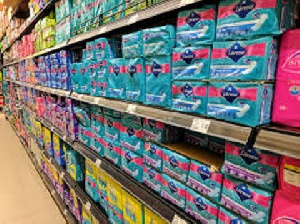 Sanitary pads displayed in a shop | File photo
Sanitary pads displayed in a shop | File photo
Women wey dey receive minimum wage for Ghana gatz spend one dollar out of di seven dollars dem dey earn on sanitary pads, according to di research wey BBC do.
Di BBC survey nine kontris for Africa to see how affordable period product be. We compare di minimum wage to di local cost of di cheapest sanitary pads and find out say many women no fit afford dem.
While Ghana na di kontri wit di least affordable menstrual products of kontris wey we survey, women across Africa dey struggle wit “period poverty” – sometin wey activists dey try change.
Joyce wey be 22-year-old Ghanaian no fit afford to buy wetin she need wen she dey on her period.
“Di only pesin wey dey available to help want sex before im give me moni. I gatz do am sake of say I need pads for di month,” she tell di BBC
For six out of di kontris wey BBC study, women wey dey receive minimum wage gatz spend between spend between 3-13% of dia salary to buy two packets of sanitary towels containing eight pads - wetin many women go need each month.
As assistant for one grocery store, Joyce live wit one family friend and survive on tips. Previously, she fit afford to meet di cost of sanitary pads wen e cost 4.88 Ghanaian cedis (45 US cents; 35 UK pence) per pack.
However, after the government increased taxes on sanitary products, a packet of pads now costs 20 cedis, pushing them out of her reach.
Di increase in price cause women to protest outside di Ghana parliament for June 2023.
Joyce come begin dey use toilet paper as pads, but wen dat one no fit continue, she say she no get options again but to accept sexual demands in return for cash for pads. But Joyce struggle na just one among many.
If you look wetin pipo for Ghana dey earn monthly, di kontri get di most expensive sanitary pads.
According to our research, one woman for Ghana wey dey earn minimum wage of $26 monthly gatz spend $3 , one in every $7 dollar dem make to buy two packets of sanitary towels wey contain eight pads.
Dat mean say for evri 80 cedis wey dem earn, dem gatz spend 11 cedis on pads alone.
In comparison, women for di US or UK go spend less moni. For example, minimum wage earners for US go spend $3 out of $1,200.
One researcher for Centre for Democratic Development (CDD) for Ghana, Francisca Sarpong Owusu, tok say many vulnerable girls and women dey use cloth rags wey dem line wit plastic sheets, cement paper bags and dried plantain stems wen dem dey menstruate sake of say dem no fit afford disposable sanitary towels.
And di problem reach far beyond Ghana. Di impact globally too much.
According to di World Bank, 500 million women worldwide no get access to menstrual products.
Dem also lack adequate facilities for menstrual hygiene management like clean water and toilets.
Di role of tax for dis kasala
Many menstrual health activists tok say to remove “tampon taxes” go help women to access and afford sanitary products.
Tampon tax refer to di different types of taxes wey dem dey impose on feminine hygiene products, including period products such as pads, menstrual cups and fit include sales tax, VAT and odas.
For 2014, Kenya become di first kontri for di world to remove tax on period products. For 2016, dem remove tax on raw materials wey dem dey use manufacture sanitary pads.
Di price for pads for Kenya don fall. Di retail price for di cheapest product na 50 Kenya shillings (35 US cents; 27 UK pence). Kenya na di kontri wit di most affordable pads for our study.
However, women politicians and campaigners dey push for further tax exemption, wit di hope say dem fit lower di price further.
For South Africa, Nokuzola Ndwandwe, one menstrual hygiene activist, dey try make goment scrap VAT on period products since 2014. For April 2019, she get "monumental victory" wen di goment scrap 15% value added tax on sanitary pads and announce free sanitary towels for public schools.
But shey tax exemption dey enough to ensure women and girls get access to pads?
For 2019, di Tanzanian goment announce say dem go re-introducing VAT on sanitary products, just one year afta dem scrap am. Dis na afta consumer complain say di prices no fall for shops and markets.
Campaigners say prices no fall sake of say goment re-introduce di tax before di supply chain of products get time to adjust.
Across Africa and di world, lack of access to menstrual hygiene products due to high cost or sake of say dem no dey available for rural or remote areas don get huge impact on millions of women.
While single piece of research no dey on how many girls miss school globally, studies for different regions and kontris reveal say thousands of girls miss many days of education evri year sake of say dem dey on dia period.